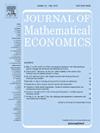对总替代品和互补品进行全球趋同的单轨交替拍卖
IF 0.7
4区 经济学
Q3 ECONOMICS
引用次数: 0
摘要
我们提出了一种新的全球收敛的动态拍卖,用于出售多个不可分割的物品。有两个有限且不相交的项目集。每个集合中的项可以是异构的,但是是替代的,两个集合中的项是互补的。每个竞标者可以要求几件物品。在每一轮拍卖中,每个竞标者都以当前价格报告他对物品的需求,而拍卖人的反应要么是提高价格,要么是降低价格。我们证明了拍卖在全球收敛于瓦尔拉斯均衡。本文章由计算机程序翻译,如有差异,请以英文原文为准。
A globally convergent alternating one-track auction for gross substitutes and complements
We propose a new globally convergent dynamic auction for selling multiple indivisible items. There are two finite and disjoint sets of items. Items in each set can be heterogeneous but are substitutes, and items across the two sets are complements. Each bidder may demand several items. In each round of the auction, every bidder reports his demand of items at the current prices and the auctioneer responds by either increasing prices or exclusively decreasing prices. We show that the auction converges globally to a Walrasian equilibrium.
求助全文
通过发布文献求助,成功后即可免费获取论文全文。
去求助
来源期刊

Journal of Mathematical Economics
管理科学-数学跨学科应用
CiteScore
1.70
自引率
7.70%
发文量
73
审稿时长
12.5 weeks
期刊介绍:
The primary objective of the Journal is to provide a forum for work in economic theory which expresses economic ideas using formal mathematical reasoning. For work to add to this primary objective, it is not sufficient that the mathematical reasoning be new and correct. The work must have real economic content. The economic ideas must be interesting and important. These ideas may pertain to any field of economics or any school of economic thought.
 求助内容:
求助内容: 应助结果提醒方式:
应助结果提醒方式:


